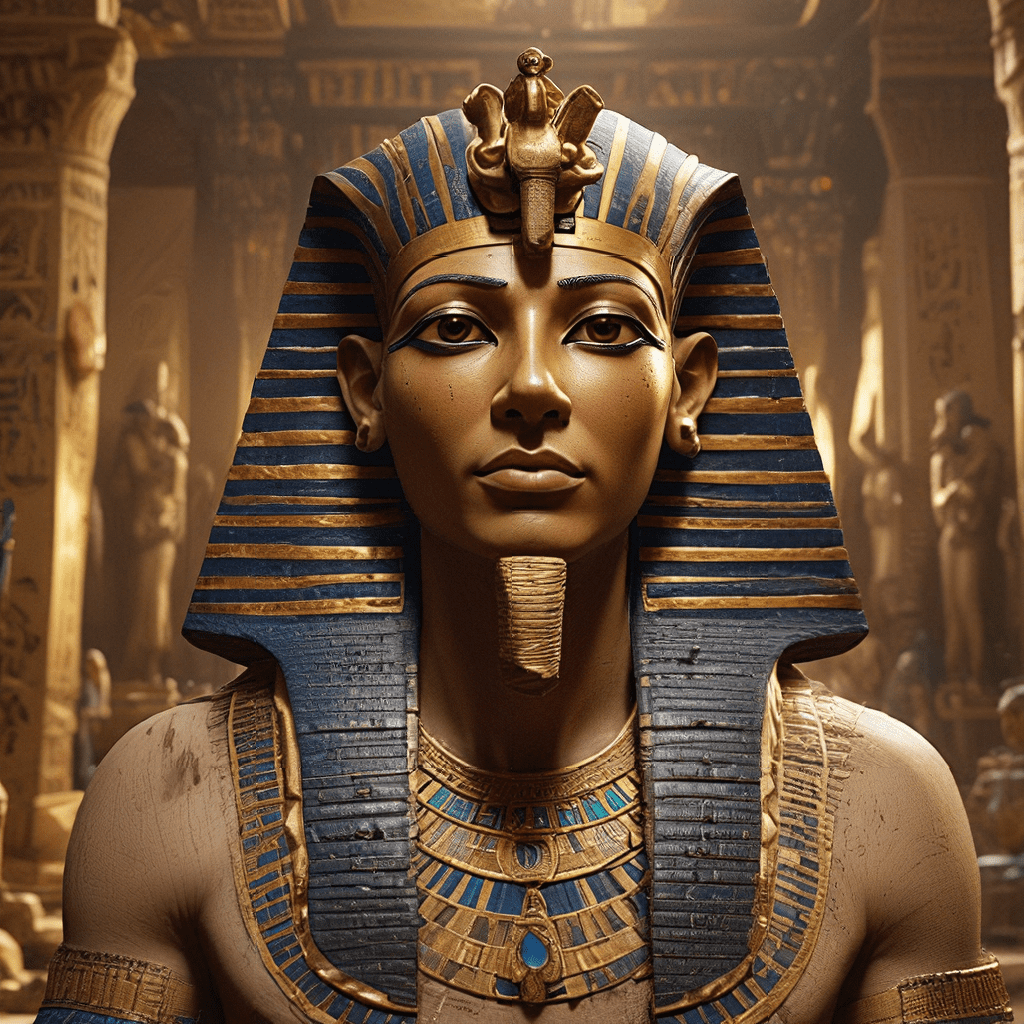The Power of the Pharaoh: Examining the Role of King in Egyptian Society
1. Introduction: The Divine King
In ancient Egypt, the Pharaoh was more than just a ruler; he was a divine king, a living embodiment of the gods. This concept of a god-king played a central role in shaping Egyptian society and defining the Pharaoh’s vast power. The Pharaoh’s authority extended across all aspects of life, from political administration and economic control to religious rituals and military leadership.
The Pharaoh was seen as the intermediary between the gods and the people, responsible for maintaining cosmic order and ensuring the well-being of the land. This divine connection granted the Pharaoh immense legitimacy and influence, solidifying his position as the supreme ruler of Egypt.
2. The Pharaoh as Divine Ruler
The Pharaoh was believed to be the human incarnation of Horus, the falcon-headed god of kingship, and the son of Ra, the sun god. This divine lineage was critical in legitimizing the Pharaoh’s power and authority. The Pharaoh’s divine status meant that his rule was divinely ordained, making him both a political and religious leader.
Ancient Egyptians believed that the Pharaoh’s divine essence allowed him to communicate with the gods, perform magical rituals, and protect the land from chaos. The Pharaoh’s connection to the divine was reinforced through elaborate rituals, ceremonies, and symbolic representations that emphasized his god-like status.
3. Political Authority and Administration
As the supreme ruler, the Pharaoh held absolute authority over all aspects of Egyptian society. He was responsible for maintaining law and order, ensuring justice, and protecting the kingdom from external threats. The Pharaoh’s political power was exercised through a complex system of administration that stretched across the entire land.
The Pharaoh relied on a hierarchy of officials to assist in running the government. These officials, often appointed from noble families, held positions in various branches of government, including the military, judiciary, and treasury. Scribes, skilled in writing and record-keeping, were essential for maintaining administrative records, managing taxes, and documenting important events. The Pharaoh’s military, composed of a powerful army and navy, protected the kingdom from enemies and expanded its borders through conquest.
4. Economic Control and Resources
The Pharaoh controlled Egypt’s vast resources and economy. As the absolute owner of all land, resources, and labor, the Pharaoh directed the distribution of wealth and ensured the prosperity of the kingdom. This control extended to all aspects of the economy, including agriculture, trade, and construction.
The Pharaoh oversaw the agricultural production of the Nile Valley, which was the backbone of the Egyptian economy. He ensured that the land was properly irrigated and that farmers had the resources they needed to produce crops. The Pharaoh also controlled trade, both within Egypt and with other civilizations, ensuring that the kingdom benefited from the exchange of goods. The Pharaoh’s power was evident in the construction of massive pyramids, temples, and monuments, which required vast resources and skilled labor that he commanded.
5. Religious Authority and Rituals
The Pharaoh was not only the political leader but also the high priest of Egypt. This religious authority made him the intermediary between the gods and the people. The Pharaoh was responsible for maintaining religious order and ensuring that the gods were appeased. He played a central role in religious ceremonies, temple construction, and festivals.
The Pharaoh’s religious duties included offering sacrifices, performing rituals, and participating in festivals dedicated to the gods. He was also responsible for commissioning the construction of temples and maintaining their upkeep. The Pharaoh’s religious authority was closely intertwined with his political power, as his ability to communicate with the gods and ensure their favor was crucial for maintaining stability and prosperity.
6. Military Leadership and Expansion
The Pharaoh was also the commander-in-chief of the Egyptian army. He led military campaigns to protect the kingdom from enemies and expand its borders. The Pharaoh’s military achievements were seen as a reflection of his divine power and his ability to defend the land.
Ancient Egyptian rulers engaged in numerous military campaigns, conquering neighboring territories and establishing the Egyptian Empire. These conquests brought wealth, resources, and prestige to the kingdom, further strengthening the Pharaoh’s power and influence. The Pharaoh’s military victories were celebrated through elaborate monuments, inscriptions, and artwork that immortalized his heroism and solidified his role as a powerful and successful leader.
7. Legacy and Succession
The Pharaoh’s legacy extended far beyond his lifetime. He was expected to leave behind a legacy of prosperity, security, and enduring monuments that would honor his reign and ensure his memory lived on. The Pharaoh’s role in ensuring the succession of his rule was critical.
The Pharaoh carefully selected his successor, often choosing a son or a close relative to inherit his throne. This process of succession aimed to maintain stability and continuity within the kingdom. The Pharaoh’s legacy was closely tied to his ability to secure a peaceful and prosperous transition of power to his successor, ensuring the continuation of his dynasty and the preservation of his divine legacy.




